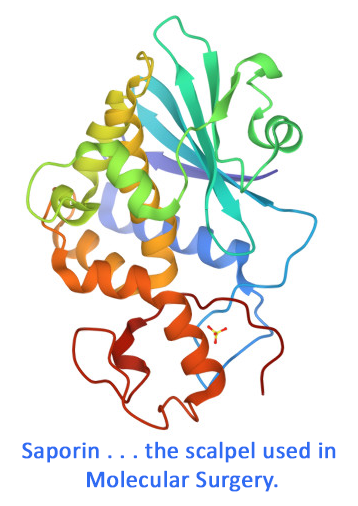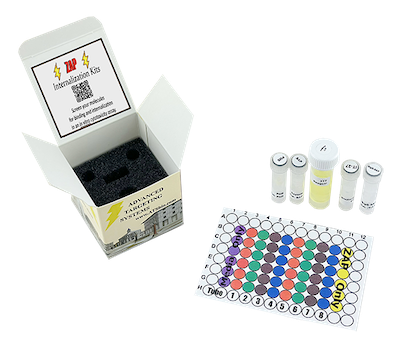There are a growing number of antibody and small molecule therapeutic candidates and this demands a quick and efficient technique to screen for biomarkers that internalize effectively upon binding. FITC-Streptavidin-ZAP (FITC-SA-ZAP) provides for the efficient determination of internalization of cell surface biomarkers upon binding of antibodies or peptides. The construct that makes this method effective was formed by crosslinking a fluorescent reporter, in this case fluorescein (FITC) and Streptavidin (SA) to the ribosome-inactivating protein, saporin (ZAP).
The conjugate used in screening potential targeting agents or cells is a mixture of a biotinylated targeting agent mixed in a 1:1 molar ratio with FITC-labeled Streptavidinylated saporin (FITC-SA-ZAP). The bond between Streptavidin and biotin is rapid and essentially nonreversible, unaffected by most extremes of pH, organic solvents, and denaturing reagents. The method provides a definitive assay readout: fluorescence within 1 hour and cell death in 72 hours. This method is designed for rapid screening, in a quick and reproducible manner, for specificity and internalization in various cell types to explore suitability of targeting agents.
This conjugate recognizes cells targeted by biotinylated materials. FITC-Streptavidin-ZAP is a chemical conjugate of fluorescein (FITC), Streptavidin (SA) and the ribosome-inactivating protein, saporin (ZAP). FITC-SA-ZAP targets cells that recognize YOUR biotinylated material, eliminates those cells via saporin, and fluoresces the cells via fluorescein isothiocyanate (FITC).
FITC-Streptavidin-ZAP is available individually (Cat. #IT-85) or unlabeled Streptavidin-ZAP (Cat. #IT-27).
keywords: streptavidin, avidin, biotin, screening, ADC, antibody drug conjugate, FITC, fluorescent, FITC-Strep-ZAP, FITC-Strep-SAP, FITC-Streptavidin-Saporin, FITC-SA-ZAP, biotinylated targeting agent, in vivo, in vitro
Screening targeting agents and their cell surface biomarkers for high specificity and rapid internalization via cell death and fluorescence
Ancheta L, Bouajram R, Lappi DA (2018) Screening targeting agents and their cell surface biomarkers for high specificity and rapid internalization via cell death and fluorescence. Neuroscience 2018 Abstracts 128.20 / M17. Society for Neuroscience, San Diego, CA.
Summary: Some of the most recent successes in the treatment of cancers or research into passive immunotherapies for neurodegenerative diseases, employ the use of antibodies. These treatments utilize antibodies that either: 1) interfere with cell surface proteins responsible for tumor cell proliferation, 2) act as immune checkpoint inhibitors, or 3) are re-engineered to allow transport of other molecules across the blood-brain barrier (BBB). There are a growing number of antibody and small molecule therapeutic candidates and this demands a quick and efficient technique to screen for biomarkers that internalize effectively upon binding. The method described provides for the efficient determination of internalization of cell surface biomarkers upon binding of antibodies or peptides. This one-step, robust method uses a targeting agent combined with both a fluorescent reporter and a cytotoxic payload. The construct that makes this method effective was formed by cross-linking a fluorescent reporter, in this case fluorescein (FITC) and streptavidin to the ribosome-inactivating protein, Saporin. The conjugate used in screening potential therapeutics is a mixture of a biotinylated targeting agent mixed in a 1:1 molar ratio with FITC-labeled Streptavidinylated-Saporin. The method provides a definitive assay readout: fluorescence within 1 hour and cell death in 72 hours. This method is designed for rapid screening, in a quick and reproducible manner, for specificity and internalization in various cell types to explore suitability of candidates as therapeutics.
Related Products: Streptavidin-ZAP (Cat. #IT-27), FITC-Streptavidin-ZAP (Cat. #IT-85)
View complete Poster.
See Also:
browse all references for this product | back to top



Reviews
There are no reviews yet.